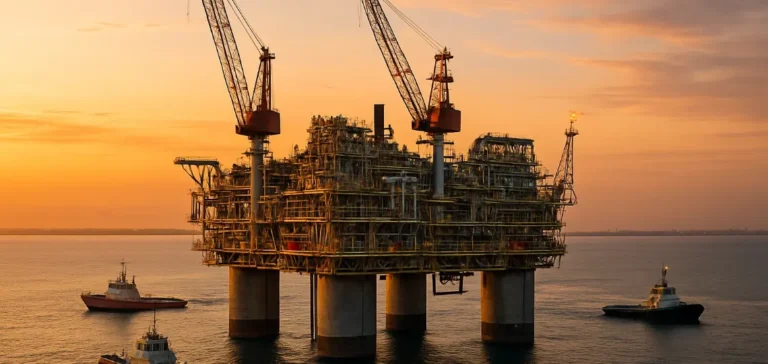Perenco Congo has announced an investment of more than $200mn in the construction of the new offshore Kombi 2 platform, currently being built in Nieuwdorp, Netherlands, by the company Dixstone. This development marks a new phase for the Congolese oil sector, with an infrastructure designed to optimise operations on the Kombi-Likalala-Libondo II (KLL II) permit and increase the value of existing resources.
Objectives of the Kombi 2 platform
According to data provided by Perenco Congo, the Kombi 2 platform will enable the recovery of up to 7mn cubic feet of gas per day and produce the necessary electricity with two gas turbines connected to a 33 kV electrical hub. This facility will also increase hydrocarbon treatment and develop an additional 10mn barrels of reserves by optimising existing wells. A dedicated module will enable the integration of new wells, with a potential for an additional 10mn barrels.
The project is part of a development plan led by Perenco Congo in partnership with Société nationale des pétroles du Congo (SNPC), African Oil & Gas Corporation (AOGC) and Petrocongo. The platform is scheduled to leave the Netherlands in October 2025 and become operational in Pointe-Noire at the beginning of 2026.
Strengthening the long-term investment strategy
The launch of Kombi 2 comes as Perenco Congo and its partners have renewed the Ikalou II and Likouala II permits for an initial period of twenty years. This renewal includes a global investment plan close to $900mn, covering workover campaigns, new drilling, and the installation of advanced infrastructure. The group’s ambition is to support the authorities’ strategy to raise national production to 500,000 barrels of oil equivalent per day by 2030.
Armel Simondin, Chief Executive Officer of Perenco, stated: “This project demonstrates a solid and lasting partnership based on mutual trust. For over twenty years, Perenco has worked alongside the Republic of Congo to develop the country’s resources while strengthening infrastructure and local expertise,” according to a statement released on June 18.
Perenco’s position in the Congolese oil sector
Perenco Congo, through its entities Congorep and Perenco Congo, has established itself as a key player in the country’s oil sector since 2001, with total production reaching 75,000 barrels of oil and gas per day in 2024. The group’s operations cover the full lifecycle of oil projects, from exploration to decommissioning, including redevelopment campaigns of mature fields and the management of new permits such as Ikalou, Mwafi, Awa, Foukanda and Djambala.
The development of the Kombi 2 project is part of a long-term strategy aimed at supporting sector growth while developing national infrastructure. Stéphane Barc, Managing Director of Perenco Congo, stated: “Kombi 2 is fully in line with our commitment to performance, operational safety, and environmental responsibility. This milestone demonstrates our ability to combine technical innovation and compliance with the most demanding standards.”






















